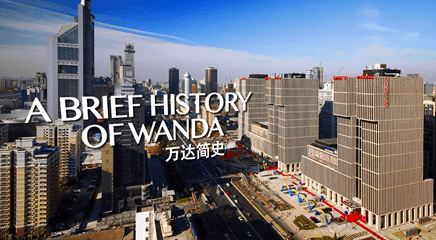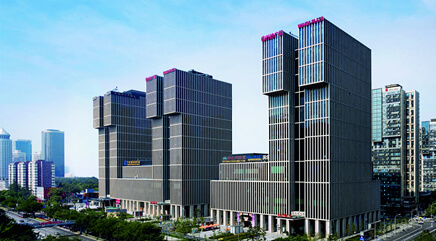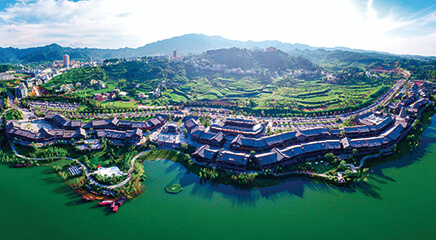Media & Audience Questions for Chairman Wang Jianlin at Oxford Open Lecture (23rd Feb)
25.02.2016Professor: A multinational firm needs connectivity, but also autonomy for local managers. Is there a tension between trying to pull together connectivity within Wanda companies while also giving them autonomy?
Wang: English is our greatest challenge! We have a lot of senior employees in Wanda. However, when going global, in tourism, sports and entertainment, inadequacy in English language is a huge challenge. Though these people are good, they can not be put to good use because of their lack of English language skills.
When we recruit locally, we give preference to English speakers and women. We receive a lot of expats in China, but they can speak good Chinese, so the language barrier is mitigated. There is no standard answer, and we need to explore by ourselves.
Many companies expanding overseas from China are state-owned companies, and they have not been successful. One of the questions from James Kynge, the Financial Times, was is the one of the reasons are these from motivated from non-commercial motivations and this is part of the problems with their investments?
Wang: When Going Global, any type of enterprise can do well and it is irrelevant whether they are private or state-owned, but in general, private companies are doing better. The difference is that the bosses of State-owned enterprises are unable to set long term goals because their position will be replaced in two or three years. Moreover, state-owned enterprises do not have international standards for their management systems, and have long cycles for their approval process.
Let me give you an example: Wanda is planning to build the highest building along the River Thames in London, an included in the project development is a high end hotel. This is an auction asset and one of our senior general managers came across this opportunity on his trip to the UK. We faced with the choice of one week completion or the asset would go to auction, when the price would be much higher. So the GM calls me and we calculated the price – it came to £900 per square meter. It’s surprisingly cheap. I made the quick decision to go for it, signed the agreement and paid the case in three days. In similar situation, it would have been very difficult for a state-owned enterprise to make that swift decision.
Last month you bought a film studio in California. When you talk about the competitive advantage of Wanda in real estate you talk about execution. You remain disciplined. Does this advantage translate easily into the cultural industry?
Wang: Execution is the only way to development. All companies need to perform. I remember that Jack Welch, a famous US management guru and former CEO of GE, who once remarked that execution is the key to a company’s success, and I fully endorse the idea. For all industries, execution is critical. In Wanda, we develop a plan for each of our business units across cinema, entertainment, sports, and properties at the beginning of each year. The plan is very detailed, with capital allocation, cashflow, and so on, broken down to weekly level. Then we incorporate an innovative system to track respective metrics on a daily, weekly, and monthly basis. If the metric is not delivered, it goes from green to yellow, and if there are two yellow lights it turns red and we have to respond. We replicate this model from real estate to other areas of the company. Some say that you need to wear t-shirts and slippers to work in the cultural entertainment industry, but I say that the ideas are up in the head, and it has no bearing on what you wear.
I am a great believer of execution, and that’s why Wanda has created the world’s only business case in opening dozens of mega commercial centers, 10-20 hotels as well as other projects in the entertainment industry and tourism, and are able to open them on the very day that we intended. It looks easy but in reality it is very hard to do.
Audience question: You have a policy of offering incentives of 10% profits to managers. But how does it work in the hotel industry? I can’t afford that myself. How do you do it?
Wang: Wanda has close to 100 five-star Wanda hotels in China and seven five-star hotels under construction overseas. There are two models in managing our hotel in China, one is self-managed by Wanda and other is managed by third party, the latter of which includes collaboration with 20 international hotel management firms.
When the business environment is favorable you can’t see the problems in front of you. Only when the economy slows down, then you can note the marked difference in performance. The hotels managed by ourselves always met their targets while it was not always the case for those managed by international hotel management firms. Our core competence is in our management and execution capabilities. We have daily reports on revenue, expenses, and profits that we submit to our headquarters which allows management to spot any potential risks and issues that may affect the achievement of our pre-set targets. Our targets break down to a daily and weekly basis, so again execution is key and can not solely rely on incentives. Hotel management is a very sophisticated industry with many moving parts. It is high end, but in practice it is the same.
Audience question: Last Fall after Xi Jinping’s visit to the UK, he remarked that China and the UK had entered a “golden age”. Has Wanda considered entering into strategic cooperation with outstanding businesses in the UK, or possibly in emerging markets?
Wang: Last year I met with the UK Trade and Investment board and proposed that they use Wanda’s platform in China to develop Chinese enterprises. First, I would invest my own money, and second, I would be bringing business to China. You have provided me with the third reason, which is to work with the UK to develop businesses across global markets. I hope I can implement your suggestions.
Audience question: Student here. Why do you pursue your fortune? Is it for wealth, or perhaps a sense of social responsibility?
Wang: I am driven to pursue a bigger, better life. I told my staff that once we had revenues of RMB100 million then we retire! Of course we didn’t, we just readjusted our goals. Next it was important that we step out nationwide. China is more than twice the size of Europe, so we then targeted to be a famous brand. So for many years the force driving me was increasingly ambitious. Over the years we wanted to make ourselves a leading global enterprise, and we have not yet achieved that goal. Maybe by 2020, and then I’ll either retire or readjust my targets. I told someone that I’d really retire after $10 billion, but we achieved that quickly thanks to the Chinese economy. It was too easy to achieve that. I thought, is it too early for me to retire? So then I reset the target. If we become a world class enterprise and earn $100 billion, I’d probably retire from business but that does not mean I would stop working. I’ll set up a charitable fund after that for different things.
Audience question: you are a very busy man. Do you reserve your personal time for something, or is work everything to you?
Wang:Work isn’t everything, but it is the most important thing. I want to have some time to myself but I can’t. I want to rest but people keep calling me all the time! For 4-5 years I haven’t been in involved in day to day operations but people still arrange for me to meet a lot of people. Now that we are an international company, a lot of foreigners would like to meet me and I attend those meetings as well. With lots of meetings and dinners, it is hard to rest.
Audience question: I would like to ask about acquisitions. The global economy is tough right no






